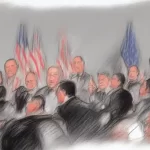This May Also Grab Your Attention:
Lawsuit Exposes State Department’s Controversial Censorship of Conservative Media Outlets
The ongoing lawsuit against the State Department alleging censorship and discrimination towards conservative news outlets has ignited a fierce debate over the limits of free speech and the role of government in shaping media narratives. While the implications of the case are significant, it is crucial to examine both sides of the argument to fully understand this contentious issue.
[For]
Supporters of the lawsuit argue that the State Department’s alleged blacklisting of conservative news outlets is a blatant violation of the First Amendment rights of those targeted. They contend that by designating certain websites as non-credible sources of information, the department is engaging in viewpoint discrimination and censorship. This restriction not only hinders the ability of outlets like Breitbart News, The Epoch Times, and The Federalist to gather and report news but also tarnishes their reputation and credibility.
Additionally, proponents emphasize the importance of media diversity and the exchange of differing opinions. They argue that the State Department’s actions undermine the principles of a free and vibrant press, which serves as a vital check on government power. By excluding conservative outlets, they claim that the department is stifling dissent and fostering an environment that discourages diversity of thought.
[Against]
On the other side of the spectrum, critics of the lawsuit contend that the State Department has every right to determine which news sources it considers credible. They argue that the department’s alleged blacklisting aims to differentiate between reliable and unreliable sources, with the intention of maintaining high standards for providing accurate information to the public and international partners.
These critics point out that the First Amendment does not guarantee a right to access government platforms or ensure that all news outlets are treated equally by the government. They argue that the government has the responsibility to prioritize reliable and credible sources, especially in the context of international communications, where misinformation can have far-reaching consequences.
The lawsuit against the State Department raises important questions about the delicate balance between protecting freedom of speech and maintaining standards of credibility and accuracy in the dissemination of information. While it is crucial to safeguard the rights of all media outlets, it is equally important to ensure that the public is not misled or exposed to unreliable sources.
Regardless of the outcome of this lawsuit, it serves as a reminder of the ongoing challenges faced by the media landscape and the need for open dialogue and critical thinking. As citizens, we must advocate for a diverse and free press while recognizing the importance of responsible journalism and the role of government in pursuing the public interest.
Here's A Video We Thought You Might Also Like:
Author Profile

- As a technology reporter, I strive to unravel the complexities of the digital age, including its impact on politics. From AI to cybersecurity, I explore the intersection of technology and governance.
Latest entries
 Breaking News2023.12.18Hispanic Democratic Lawmaker Shocks Party, Joins Republicans in Pushing for Tougher Border Security!
Breaking News2023.12.18Hispanic Democratic Lawmaker Shocks Party, Joins Republicans in Pushing for Tougher Border Security! Breaking News2023.12.17Kellyanne Conway’s Bold Move to Reshape the Republican Party’s Abortion Strategy!
Breaking News2023.12.17Kellyanne Conway’s Bold Move to Reshape the Republican Party’s Abortion Strategy! Breaking News2023.12.15Joe Biden’s Struggle for Black Voter Support Can He Regain Their Trust
Breaking News2023.12.15Joe Biden’s Struggle for Black Voter Support Can He Regain Their Trust Breaking News2023.12.15Explosive Demand for Answers on Denied Border Funding Stirs Controversy
Breaking News2023.12.15Explosive Demand for Answers on Denied Border Funding Stirs Controversy






